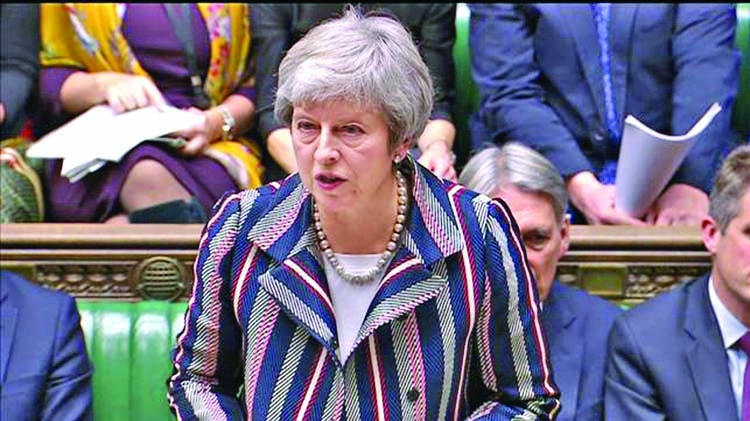May to face lawmakers after stinging Brexit defeat

British Prime Minister Theresa May returns to the House of Commons Wednesday after a series of stunning defeats by MPs that threaten her government and could change the course of Brexit. May will take questions from MPs the day after they found her ministers in contempt over the legal advice on her EU withdrawal agreement, and gave them a bigger say if as expected the deal is rejected on December 11.
The Northern Irish party, on which the prime minister relies for support in parliament, sided with the main opposition Labor party on the contempt vote, raising serious questions about her ability to govern. Meanwhile, 25 of her own Conservative MPs voted with Labor to give the Commons the ability to decide what happens next if it votes down the Brexit deal.
"The day May lost control," read the front page headline of the Conservative-supporting Daily Telegraph newspaper. In a dramatic hour on Tuesday evening, the government lost three key votes that exposed just how little support it has in the Commons, as MPs assert their power ahead of Britain's exit from the EU in March. Northern Ireland's Democratic Unionist Party (DUP) joined opposition MPs in two votes that found ministers in contempt of parliament for failing to publish in full the legal advice on the Brexit deal.
Commons leader Andrea Leadsom said the decision was "incredibly disappointing", as it broke centuries of convention of keeping such advice secret, but said the document would be published on Wednesday. MPs also voted to approve an amendment tabled by Conservative former attorney general Dominic Grieve, which allows parliament to determine what happens if the deal falls.
If May loses the vote next week, the government has 21 days to return to MPs to say what happens next. Grieve's amendment, which passed by 321 votes to 299, could allow MPs to amend that statement, raising the possibility they could demand a re-negotiation, a second referendum or even stay in the EU. "Brexit on the brink," headlined the Daily Mail.
'Brexit shambles' May opened the first of five days of debate on the Brexit deal on Monday evening, with a personal plea for MPs not to sabotage the result of months of tough negotiations with the EU. "This argument has gone on long enough. It is corrosive to our politics and life depends on compromise," she said. The eight-hour debate, which continued until 1:00am (0100 GMT), was characterized by heckling from all sides.
Labor leader Jeremy Corbyn called May's plan "a huge and damaging failure for Britain". Former foreign minister Boris Johnson, who quit over May's approach to Brexit in July and has long, had his eye on her job, warned that Britain threatened to become the EU's "de facto colony".
There are few people who believe May's deal will now survive the vote next Tuesday, but the question of what happens then remains wide open. Some Conservative MPs are pushing for a second referendum, with a choice of staying in the EU, and they received an unexpected boost on Monday. Campos Sanchez-Bordona, the advocate general of the European Court of Justice (ECJ), said in a non-binding opinion that London had the right to halt Brexit without the agreement of other EU states.
Going round in circles But May warned that another Brexit vote would do nothing to settle bitter debates about Britain's place in Europe that have raged since it joined the bloc in 1973. "We cannot afford to spend the next decade as a country going round in circles," she argued. Many MPs want May to return to Brussels to renegotiate her deal, and she is due at a summit two days after next week's vote.
However, EU leaders have repeatedly said they will not reopen the divorce deal. Other MPs are pushing for Britain to stay in the European Economic Area (EEA), which would protect the economy but would not fulfill the referendum promise of ending free movement of workers from the EU.
Some euro skeptic Conservatives meanwhile believe Britain can leave without any deal at all -- although a government assessment last week found this risked causing a major recession. What is almost certain is that May herself would face a challenge if her vote failed, either by Labor tabling a confidence vote in the Commons, or her own Conservative MPs launching a leadership contest.
